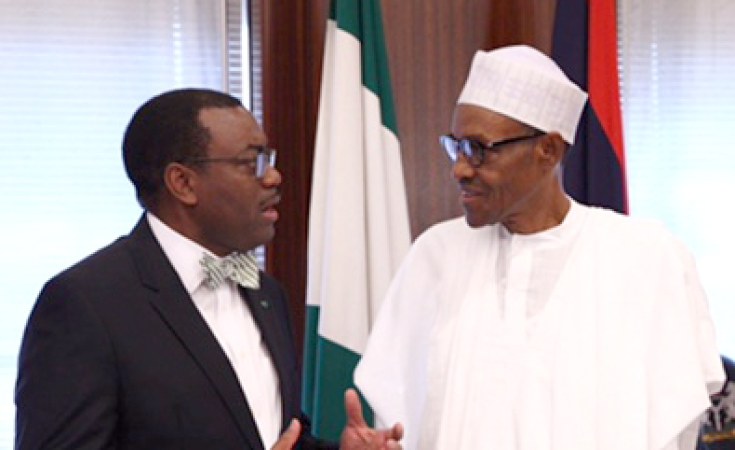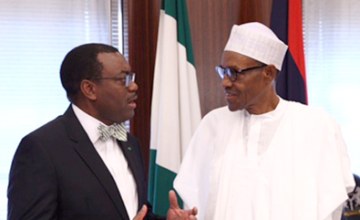Executive Directors of the African Development Bank (AfDB) on Wednesday, November 2, 2016 approved a US $600-million loan, being the first tranche of a US $1-billion budget support loan to help finance Nigeria's Economic Governance, Diversification and Competitiveness Support Program (EGDCSP). The last tranche of US $400 million will be approved in 2017.
This operation is part of a two-fiscal-year (2016-2017) programmatic counter-cyclical fiscal support in a context where the Federal Government of Nigeria is implementing reforms to achieve efficiency in the business of government, combat corruption and promote diversification and competitiveness of the economy. It will help the government create fiscal space to facilitate a smooth implementation of the Government's budget, support fiscal and structural reforms, and improve the targeting of social sector spending to protect the most vulnerable segments of the population.
It will assist the country's efforts to quickly build a buffer of foreign exchange reserves, which would contribute to easing pressure on the foreign exchange market and stabilizing the Naira.
Nigeria's success in its efforts to achieve macroeconomic stability and economic recovery would signal the end of the current recession, which, if prolonged, has potential to severely affect the economies of neighbouring countries in West and Central Africa.
"We must think through innovative solutions to support our regional member countries in crisis situations like this," AfDB President Akinwumi Adesina told the Board following the approval. "We must also provide them with the knowledge products they require to get back on track," he added.
In addition, given FGN's demonstrated commitment to significantly scale up infrastructure investments (representing 30% of the 2016 Budget), the resources will contribute to creating the fiscal space for investments in power, housing and transport, which are key sectors for stimulating the strong economic growth required to exit the recession.
Nigeria's economy has been hard hit by sharp decline in oil prices. Despite being broad-based with agriculture and services representing the lion's share of GDP, the economy is heavily dependent on the oil sector, which provides the bulk of government revenues and exports. Over 90% of exports and at least 70% of government revenues come from the oil sector.
Output is projected to contract in 2016 by 1.6%, as the economy slipped into a recession in the second half of 2016, marked by foreign currency shortages arising from lower oil receipts, sharp reduction in power generation, vandalism of oil installations, lower oil production and weak investor confidence.
The program is also expected to enable the share of non-oil revenues to grow by 8% in 2016. Expenditure control measures should result in further reduction in wage bill growth and reduction in debt service costs. In addition, these reforms will infuse efficiency, transparency and accountability, generate more revenues and create fiscal space to fund the economic diversification, industrialization drive and social inclusion programs. The improved macroeconomic environment will support the medium-term inclusive growth and poverty reduction agenda.
Apart from dialogue with the Government in preparing this operation, consultations were held with other stakeholders including the private sector, civil society organizations (CSOs), and development partners.
The EGDCSP is designed to achieve the following objectives: (i) strengthening public finance management through enhanced fiscal performance and sustainability (expanded and efficient tax base and improved revenue collection, improved efficiency of public expenditure, and enhanced fiscal transparency and accountability); (ii) improve energy market competitiveness; (iii) enhance agriculture sector policy and institutional environment; and (iv) foster social inclusion by protecting and empowering poor and vulnerable groups.
It is aligned with three of the operational priorities of the Bank's Ten-Year Strategy, 2013-2022, namely infrastructure, private sector development, and governance and accountability, which are reiterated in four of the High-5s: emphasizing scaling up investments in key areas of the Ten-Year Strategy: Light up and power Africa; Feed Africa; Industrialize Africa; and Improve the quality of life for the people of Africa.
The program is also linked to the three strategic pillars of the Governance Framework and Action Plan, 2014-2018 (GAP II), emphasizing sound public sector economic management, good governance, and investment and business climate enhancement. Through the Nigeria Country Office (ORNG), the Bank maintains continuous dialogue with the Government on the design and implementation of its reform programs, including measures targeting the energy and agriculture sectors, fiscal reforms, and issues of transparency and accountability.
At end December 2015, the Bank's portfolio comprised 46 operations estimated at US $3.01 billion. The portfolio consist of 22 public sector operations valued at US $1.51 billion which represents 31% of the entire portfolio and 24 private sector projects estimated US $2.21 billion or 69% of the portfolio.



